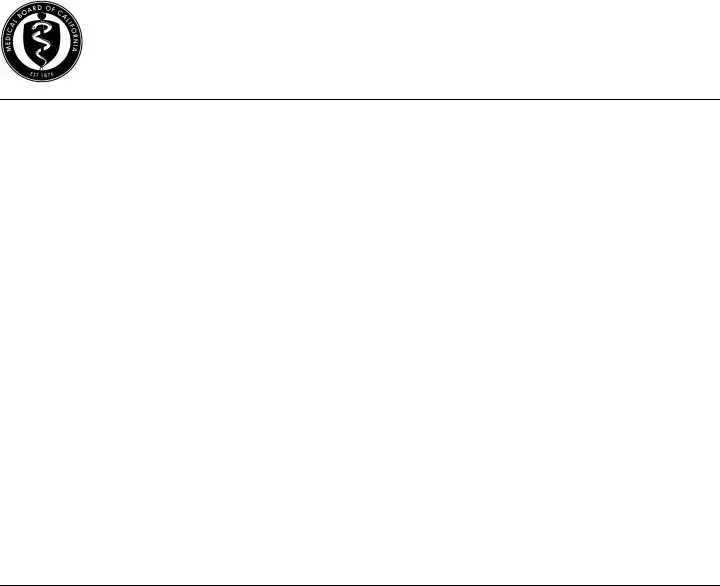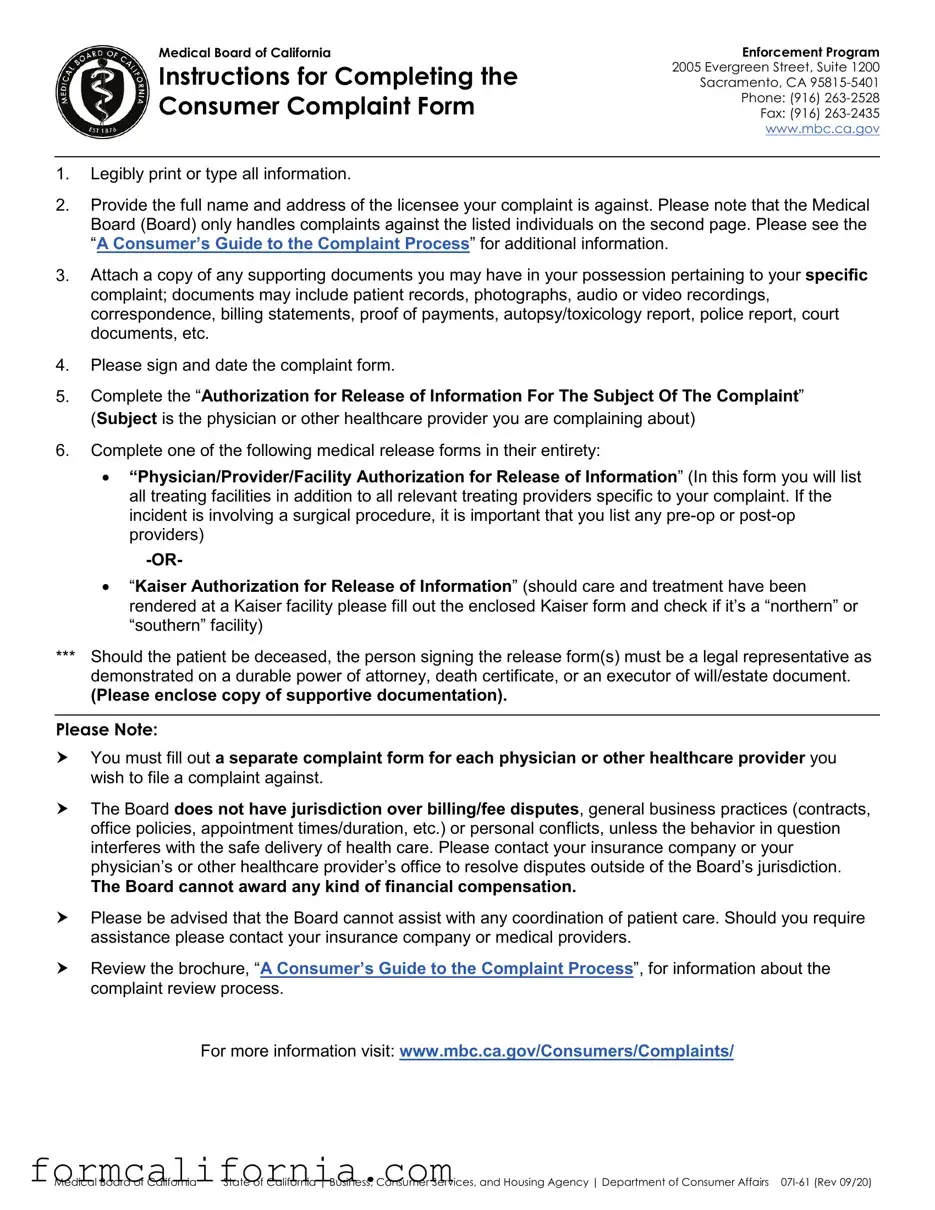Blank Ca Board Complaint PDF Form
Filing a complaint with the Medical Board of California can seem daunting, but it's a process designed to protect patients and ensure the highest standards of medical practice. The Enforcement Program's Consumer Complaint Form is a critical tool in this effort, providing a structured way for individuals to raise concerns about the quality of care, office practices, provider impairment, or any unlicensed activity they may have encountered in their healthcare experience. This form demands careful completion, requiring the complainant to provide specific details about the healthcare provider in question, including their full name and address, and the nature of the complaint, be it related to the quality of care, office practice issues, inappropriate prescribing, provider impairment, sexual misconduct, or unlicensed activity. Importantly, the form also instructs on attaching supporting documentation such as medical records, photographs, and other evidence relevant to the complaint to facilitate a thorough review. For cases involving the handing over of medical information, the form includes a section for authorizing the release of pertinent patient records, ensuring the board has all the necessary information to proceed with an investigation. It's a comprehensive approach, ensuring that complaints are detailed, documented, and legally sound, allowing the board to maintain the high standards expected of California's healthcare providers.
Document Preview Example

Medical Board of California |
Enforcement Program |
|
Instructions for Completing the |
2005 Evergreen Street, Suite 1200 |
|
Sacramento, CA |
||
Consumer Complaint Form |
Phone: (916) |
|
Fax: (916) |
||
www.mbc.ca.gov
1.Legibly print or type all information.
2.Provide the full name and address of the licensee your complaint is against. Please note that the Medical Board (Board) only handles complaints against the listed individuals on the second page. Please see the “A Consumer’s Guide to the Complaint Process” for additional information.
3.Attach a copy of any supporting documents you may have in your possession pertaining to your specific complaint; documents may include patient records, photographs, audio or video recordings, correspondence, billing statements, proof of payments, autopsy/toxicology report, police report, court documents, etc.
4.Please sign and date the complaint form.
5.Complete the “Authorization for Release of Information For The Subject Of The Complaint” (Subject is the physician or other healthcare provider you are complaining about)
6.Complete one of the following medical release forms in their entirety:
•“Physician/Provider/Facility Authorization for Release of Information” (In this form you will list all treating facilities in addition to all relevant treating providers specific to your complaint. If the incident is involving a surgical procedure, it is important that you list any
•“Kaiser Authorization for Release of Information” (should care and treatment have been rendered at a Kaiser facility please fill out the enclosed Kaiser form and check if it’s a “northern” or “southern” facility)
***Should the patient be deceased, the person signing the release form(s) must be a legal representative as demonstrated on a durable power of attorney, death certificate, or an executor of will/estate document.
(Please enclose copy of supportive documentation).
Please Note:
You must fill out a separate complaint form for each physician or other healthcare provider you wish to file a complaint against.
The Board does not have jurisdiction over billing/fee disputes, general business practices (contracts, office policies, appointment times/duration, etc.) or personal conflicts, unless the behavior in question interferes with the safe delivery of health care. Please contact your insurance company or your physician’s or other healthcare provider’s office to resolve disputes outside of the Board’s jurisdiction.
The Board cannot award any kind of financial compensation.
Please be advised that the Board cannot assist with any coordination of patient care. Should you require assistance please contact your insurance company or medical providers.
Review the brochure, “A Consumer’s Guide to the Complaint Process”, for information about the complaint review process.
For more information visit: www.mbc.ca.gov/Consumers/Complaints/
Medical Board of California State of California | Business, Consumer Services, and Housing Agency | Department of Consumer Affairs

Medical Board of California |
Enforcement Program |
|
Consumer Complaint Form |
2005 Evergreen Street, Suite 1200 |
|
Sacramento, CA |
||
|
Phone: (916) |
|
|
Fax: (916) |
|
www.mbc.ca.gov
COMPLAINT REGISTERED AGAINST
Check one: Physician (MD) |
Podiatrist (DPM) |
Midwife |
Polysomnographer Research Psychoanalyst Unlicensed Provider Subject Information
Last Name |
First Name |
Middle Initial |
Provider’s License Number |
||
|
|
|
|
|
|
Office/Facility Name |
|
|
|
|
Phone Number |
|
|
|
|
|
|
Street Address |
|
|
|
|
|
|
|
|
|
|
|
City |
|
State |
|
Zip Code |
|
|
|
|
|
|
|
PERSON REGISTERING COMPLAINT
Last Name |
|
First Name |
|
Middle Initial |
|
|
|
|
|
|
|
Street Address |
|
|
|
|
|
|
|
|
|
|
|
City |
|
|
State |
Zip Code |
|
|
|
|
|
|
|
Phone Number |
Email Address |
|
|
||
|
|
|
|
|
|
PATIENT INFORMATION
Patient’s Name
Patient’s Date of Birth
Your Relationship to Patient
NATURE OF COMPLAINT (Check all that apply)
Quality of Care (Misdiagnosis, treatment/medication causing side effects, surgical complications, negligent care, etc.)
Office Practice (Failure to sign death certificate, failure to provide records, misleading advertising, double billing, billing for services not rendered)
Inappropriate Prescribing
Provider Impairment (Under the influence of drugs or alcohol, mental or physical impairment)
Sexual Misconduct
Unlicensed Activity (Aiding and abetting unlicensed practice, unlicensed provider)
Medical Board of California State of California | Business, Consumer Services, and Housing Agency | Department of Consumer Affairs

DETAILS OF COMPLAINT (Attach additional pages if necessary)
State your complaint in chronological order and in detail. In addition, please include dates of treatment and list all relevant treating providers specific to your complaint. It is important that you be specific regarding any allegations of substandard care. Providing a comprehensive narrative of your complaint allows for a more expeditious review process.
Signature
Date
Medical Board of California |
State of California | Business, Consumer Services, and Housing Agency | Department of Consumer Affairs |

Medical Board of California
Authorization for Release of Information for the Subject of the Complaint
Enforcement Program
2005 Evergreen Street, Suite 1200
Sacramento, CA
Phone: (916)
Fax: (916)
www.mbc.ca.gov
CHECK ALL RECORD TYPES THAT APPLY
Medical Records |
Diagnostic Images |
|
HIV/AIDS |
Alcohol/Drug Abuse |
|
Psychiatric |
|
|
|
|
|
PATIENT INFORMATION |
|
|
|
|
|
Patient Name |
|
|
|
|
|
|
|
|
Date of Birth |
|
|
|
|
|
|
|
|
Date of Death (If applicable) |
|
|
|
|
|
|
|
|
Medical Record Number (If known) |
|
|
|
|
|
|
|
|
Control Number |
|
|
|
|
|
Continued on Page 2
Medical Board of California |
State of California | Business, Consumer Services, and Housing Agency | Department of Consumer Affairs |
(Rev 06/20) |

Patient Name: |
Page 2 of 2 |
I, the undersigned hereby authorize:
Physician/Provider
Street Address
City
State
Zip Code
Phone Number
Treatment Date(s)
to disclose medical records in the course of my diagnosis and treatment to the Medical Board of California, Enforcement Program, a healthcare oversight agency. This disclosure of records authorized herein is required for official use, including investigation and possible administrative and/or criminal proceedings regarding any violations of the laws of the State of California. This authorization shall remain valid for three years from the date of signature. A copy of this authorization shall be as valid as the original. I understand that I have the right to receive a copy of this authorization if requested by me. I understand that I have a right to revoke this authorization by sending written notification to the Medical Board of California at the above address. My written revocation will be effective upon receipt by the Medical Board of California but will not be effective to the extent that such persons have acted in reliance upon this Authorization. I understand that the recipient of my information is not a health plan or healthcare provider and the released information may no longer be protected by federal privacy regulations. I am signing this authorization voluntarily and understand that treatment, payment, or my eligibility for benefits will not be affected if I do not sign this authorization.
Patient Signature
- OR -
Legal Representative Name
Legal Representative Signature
Date
Relationship to Patient
Date
NOTE: Failure by a physician, podiatrist, or healthcare provider to provide the requested records within 15 days, or a healthcare facility within 30 days, of receipt of this request and authorization may constitute a violation of Section 2225.5 of the Medical Practice Act and may result in further action by the Board.
Medical Board of California |
State of California | Business, Consumer Services, and Housing Agency | Department of Consumer Affairs |
(Rev 06/20) |

Medical Board of California |
|
|
Enforcement Program |
||
Physician/Provider/Facility Authorization |
2005 Evergreen Street, Suite 1200 |
||||
Sacramento, CA |
|||||
for Release of Information |
|
|
Phone: (916) |
||
|
|
Fax: (916) |
|||
|
|
|
|
|
www.mbc.ca.gov |
|
|
|
|
|
|
CHECK ALL RECORD TYPES THAT APPLY |
|
|
|
||
Medical Records |
|
Diagnostic Images |
|||
HIV/AIDS |
|
Alcohol/Drug Abuse |
|||
Psychiatric |
|
|
|
|
|
|
|
|
|
|
|
PATIENT INFORMATION |
|
|
|
|
|
|
|
|
|
|
|
Patient Name |
|
|
|
|
|
|
|
|
|
|
|
|
|
|
|
|
|
Date of Birth |
|
|
|
|
|
|
|
|
|
|
|
|
|
|
|
|
|
Date of Death (If applicable) |
|
|
|
|
|
|
|
|
|
|
|
|
|
|
|
|
|
Medical Record Number (If known) |
|
|
|
||
|
|
|
|
|
|
|
|
|
|
|
|
Control Number |
|
|
|
|
|
|
|
|
|
|
|
I, the undersigned hereby authorize: |
|
|
|
||
|
|
|
|
|
|
Physician/Provider/Facility |
|
|
|
|
|
|
|
|
|
|
|
Street Address |
|
|
|
|
|
|
|
|
|
|
|
City |
|
|
State |
Zip Code |
|
|
|
|
|
|
|
Phone Number |
|
Treatment Date(s) |
|
||
|
|
|
|
|
|
|
|
|
|
|
|
Physician/Provider/Facility |
|
|
|
|
|
|
|
|
|
|
|
Street Address |
|
|
|
|
|
|
|
|
|
|
|
City |
|
|
State |
Zip Code |
|
|
|
|
|
||
Phone Number |
|
Treatment Date(s) |
|
||
|
|
|
|
||
|
|
Continued on Page 2 |
|
||
Medical Board of California |
State of California | Business, Consumer Services, and Housing Agency | Department of Consumer Affairs |
(Rev 06/20) |

Patient Name: |
Page 2 of 2 |
Physician/Provider/Facility
Street Address
City
State
Zip Code
Phone Number
Treatment Date(s)
to disclose medical records in the course of my diagnosis and treatment to the Medical Board of California, Enforcement Program, a healthcare oversight agency. This disclosure of records authorized herein is required for official use, including investigation and possible administrative and/or criminal proceedings regarding any violations of the laws of the State of California. This authorization shall remain valid for three years from the date of signature. A copy of this authorization shall be as valid as the original. I understand that I have the right to receive a copy of this authorization if requested by me. I understand that I have a right to revoke this authorization by sending written notification to the Medical Board of California at the above address. My written revocation will be effective upon receipt by the Medical Board of California but will not be effective to the extent that such persons have acted in reliance upon this Authorization. I understand that the recipient of my information is not a health plan or healthcare provider and the released information may no longer be protected by federal privacy regulations. I am signing this authorization voluntarily and understand that treatment, payment, or my eligibility for benefits will not be affected if I do not sign this authorization.
Patient Signature
- OR -
Legal Representative Name
Legal Representative Signature
Date
Relationship to Patient
Date
NOTE: Failure by a physician, podiatrist, or healthcare provider to provide the requested records within 15 days, or a healthcare facility within 30 days, of receipt of this request and authorization may constitute a violation of Section 2225.5 of the Medical Practice Act and may result in further action by the Board.
Medical Board of California |
State of California | Business, Consumer Services, and Housing Agency | Department of Consumer Affairs |
(Rev 06/20) |

Medical Board of California
Kaiser Authorization for Release of Information
Enforcement Program
2005 Evergreen Street, Suite 1200
Sacramento, CA
Phone: (916)
Fax: (916)
www.mbc.ca.gov
CHECK ALL RECORD TYPES THAT APPLY
Medical Records |
Diagnostic Images |
|
HIV/AIDS |
Alcohol/Drug Abuse |
|
Psychiatric |
|
|
|
|
|
PATIENT INFORMATION |
|
|
|
|
|
Patient Name |
|
|
|
|
|
|
|
|
Date of Birth |
|
|
|
|
|
|
|
|
Date of Death (If applicable) |
|
|
|
|
|
|
|
|
Medical Record Number (If known) |
|
|
|
|
|
|
|
|
Control Number |
|
|
|
|
|
Continued on Page 2
Medical Board of California |
State of California | Business, Consumer Services, and Housing Agency | Department of Consumer Affairs |
(Rev 06/20) |

Patient Name: |
Page 2 of 2 |
I, the undersigned hereby authorize:
Physician/Provider/Facility: Kaiser Permanente (Northern Facilities)
Physician/Provider/Facility: SCPMG/Kaiser Foundation Hospital (Southern Facilities) Treatment Date(s)
to disclose medical records in the course of my diagnosis and treatment to the Medical Board of California, Enforcement Program, a healthcare oversight agency. This disclosure of records authorized herein is required for official use, including investigation and possible administrative and/or criminal proceedings regarding any violations of the laws of the State of California. This authorization shall remain valid for three years from the date of signature. A copy of this authorization shall be as valid as the original. I understand that I have the right to receive a copy of this authorization if requested by me. I understand that I have a right to revoke this authorization by sending written notification to the Medical Board of California at the above address. My written revocation will be effective upon receipt by the Medical Board of California but will not be effective to the extent that such persons have acted in reliance upon this Authorization. I understand that the recipient of my information is not a health plan or healthcare provider and the released information may no longer be protected by federal privacy regulations. I am signing this authorization voluntarily and understand that treatment, payment, or my eligibility for benefits will not be affected if I do not sign this authorization.
Patient Signature
- OR -
Legal Representative Name
Legal Representative Signature
Date
Relationship to Patient
Date
NOTE: Failure by a physician, podiatrist, or healthcare provider to provide the requested records within 15 days, or a healthcare facility within 30 days, of receipt of this request and authorization may constitute a violation of Section 2225.5 of the Medical Practice Act and may result in further action by the Board.
Medical Board of California |
State of California | Business, Consumer Services, and Housing Agency | Department of Consumer Affairs |
(Rev 06/20) |
Document Specs
| Fact | Description |
|---|---|
| Form Purpose | To file a complaint against healthcare providers under the jurisdiction of the Medical Board of California. |
| Information Requirements | Complete details of the complaint, including the provider's full name and address, supporting documents, and a signed and dated form. |
| Supporting Documents | May include patient records, photographs, correspondence, billing statements, and more, which pertains to the complaint. |
| Governing Law | Managed under the policies and procedures outlined by the Medical Board of California and related California state laws. |
Detailed Instructions for Writing Ca Board Complaint
Filing a complaint with the Medical Board of California is a step individuals take when they believe a healthcare provider has not met professional standards. This process is crucial for ensuring accountability and maintaining the integrity of healthcare services. Once the complaint form is submitted, the Board reviews the provided information and carries out an investigation if warranted. Here are the steps needed to fill out the form accurately:
- Print or type all information clearly. Ensure every detail is legible to avoid any misunderstandings or delays.
- Identify the licensee. Provide the full name and address of the healthcare provider you're filing a complaint against. The Board only investigates complaints about certain licensees, so check the second page for eligibility.
- Include supporting documents. Attach any relevant materials such as medical records, photos, audio or video recordings, correspondences, billing statements, and legal documents that can substantiate your complaint.
- Sign and date the form. Your signature legitimizes the complaint and allows the Board to proceed with the review process.
- Fill out the “Authorization for Release of Information For The Subject Of The Complaint” section. This is necessary for the Board to access the specified medical records or information related to your complaint.
- Choose and complete the appropriate medical release form. Select either the general "Physician/Provider/Facility Authorization for Release of Information" or the "Kaiser Authorization for Release of Information" if applicable. Include details of all relevant healthcare providers or facilities related to the complaint.
- If the patient is deceased, the person filling the form must be a legal representative and attach supporting documentation such as a power of attorney, death certificate, or executor of estate documents.
- Remember, separate complaints require separate forms. If you have issues with more than one provider, each complaint needs its own documentation.
- The Board does not handle billing disputes, general business concerns, or personal conflicts unless they directly impact healthcare safety.
- For assistance outside of what the Board offers, contact your insurance company or healthcare provider directly.
- Review the “A Consumer’s Guide to the Complaint Process” brochure for a more detailed understanding of what follows after submission.
After the form is submitted, the Board evaluates the information. If the complaint falls within their jurisdiction and merits further investigation, they will proceed with the necessary steps. This might include gathering more evidence, contacting the subject of the complaint, and potentially holding hearings to resolve the matter. It's important to provide as much detail and supporting documentation as possible to aid the Board in its investigation.
Things to Know About This Form
What types of complaints does the Medical Board of California handle?
The Medical Board of California handles complaints related to the quality of care, such as misdiagnosis, treatment or medication causing side effects, surgical complications, and negligent care. Complaints about office practices like failure to sign a death certificate, failure to provide records, misleading advertising, double billing, and billing for services not rendered are also addressed. Other areas include inappropriate prescribing, provider impairment (being under the influence of drugs or alcohol), sexual misconduct, and unlicensed activity (aiding and abetting unlicensed practice). However, the Board does not manage disputes over billing and fees, general business practices, or personal conflicts unless they interfere with the safe delivery of health care.
How do I complete and submit a complaint form to the Medical Board of California?
To submit a complaint, you need to legibly print or type all information on the complaint form. Include the full name and address of the licensee you are complaining about and attach copies of any supporting documents related to your complaint. These documents can include patient records, photographs, audio or video recordings, correspondence, billing statements, and more. After completing the form and the "Authorization for Release of Information For The Subject Of The Complaint," ensure you sign and date it before submission. Separate complaint forms must be filled out for each healthcare provider you wish to file a complaint against.
Can I file a complaint against any healthcare provider?
Complaints can only be filed against individuals who are licensed by the Medical Board of California. This includes physicians, podiatrists, midwives, polysomnographers, research psychoanalysts, and unlicensed providers if their activity falls under the Board's jurisdiction. It’s crucial to check that the healthcare provider is listed as licensed by the Board before filing a complaint.
What information is necessary to provide when submitting a complaint?
When submitting a complaint, it is important to provide specific and detailed information, including:
- The full name and address of the licensee.
- A detailed chronological account of the complaint, including dates of treatment and the names of all relevant providers involved.
- Any allegations of substandard care should be clearly detailed.
- Copies of relevant supporting documents.
This detailed information helps in a more expeditious review process of the complaint.
What happens after I submit a complaint?
After submitting a complaint, the Medical Board reviews the information provided to determine whether the allegations fall within its jurisdiction and if enough evidence exists to proceed with an investigation. If so, an investigation will be initiated, and you may be contacted for further information. It is important to review the brochure “A Consumer’s Guide to the Complaint Process” for a detailed overview of the review and investigation process.
Is there a statute of limitations for filing a complaint?
The document does not specify a statute of limitations for filing complaints. However, it is generally advisable to file a complaint as soon as possible to ensure that evidence and witnesses are more readily available and to potentially avoid any specific statute of limitations that could apply to certain allegations.
Does the Board handle billing disputes or financial compensation?
The Board does not handle billing disputes or general business practices such as contracts, office policies, or personal conflicts unless they interfere with the safe delivery of health care. Additionally, the Board cannot award any kind of financial compensation. For billing disputes, contact your insurance company or the healthcare provider directly.
What if the patient involved in the complaint is deceased?
If the patient involved in the complaint is deceased, the person filing the complaint must be a legal representative. This can be demonstrated with a durable power of attorney, death certificate, or an executor of will/estate document. A copy of this documentation must be enclosed with the complaint form.
Common mistakes
Completing the Medical Board of California Complaint Form accurately is crucial for ensuring your complaint is addressed promptly and adequately. Unfortunately, many people inadvertently make errors that can delay the process or even affect the outcome. Here are ten mistakes to avoid:
- Not printing legibly or typing. If the form is not clear and readable, processing your complaint might be delayed.
- Failing to provide the full name and address of the licensee. The more specific you are, the easier it is for the Board to identify the correct individual.
- Omit.assetting to attach supporting documents. These could be crucial in substantiating your complaint.
- Forgetting to sign and date the form. An unsigned form is considered incomplete and will not be processed.
- Lack of completeness in the “Authorization for Release of Information For The Subject Of The Complaint” section. This authorization is vital for the Board to obtain necessary records.
- Choosing the wrong medical release form or not filling it out entirely. Whether it’s the general form or the Kaiser-specific one, it needs to be correct and complete.
- Not enclosing proof of legal representation in cases where the patient is deceased. Without this, the Board may not be able to proceed.
- Filing a single complaint form for multiple physicians. Each provider requires a separate complaint form.
- Attempting to file complaints about issues outside the Board’s jurisdiction, such as billing disputes or general business practices. This wastes time and resources.
- Providing vague details about the complaint. A well-detailed and chronological account ensures a clearer understanding and quicker review process.
Remember, the goal of the complaint form is to provide enough clear, concise, and relevant information so the Board can address your concerns effectively. Avoiding these common mistakes not only helps streamline the review process but also enhances the likelihood of a more favorable outcome for your complaint.
Documents used along the form
When lodging a complaint with the California Medical Board, the complaint form itself kickstarts the process, but it’s often not the only document involved. For an effective and comprehensive review, various forms and documents may accompany your complaint, each serving a unique purpose to bolster the case and provide the necessary depth of information. Familiarizing oneself with these accompaniments can streamline the process and enhance the clarity and impact of the complaint being lodged.
- A Consumer’s Guide to the Complaint Process: This document serves as a valuable resource for understanding the steps involved in filing a complaint, what to expect during the review process, and the overall procedure followed by the Medical Board of California. It is a must-read for anyone navigating this terrain.
- Authorization for Release of Information For The Subject Of The Complaint: Essential for authorizing the release of medical records related to the complaint. By completing this form, the complainant allows healthcare providers to share pertinent medical information with the Medical Board for investigation purposes.
- Physician/Provider/Facility Authorization for Release of Information: This form is particularly necessary when the complaint involves specific treatment or procedures. It lists treating facilities and healthcare providers relevant to the case, ensuring all relevant medical records are accessible for review.
- Kaiser Authorization for Release of Information: Tailored for complaints involving care received at Kaiser facilities, this specialized form addresses the bureaucratic nuances of obtaining medical records from Kaiser Permanente, distinguishing between "northern" and "southern" facilities.
- Legal Representative Documentation: If the patient involved in the complaint is deceased, documentation proving the legal standing of the representative (e.g., durable power of attorney, death certificate, executor of will) is crucial to authenticate their authority to file the complaint.
- Additional Evidence Supporting the Complaint: This might include photographs, audio/video recordings, correspondence, billing statements, or any proof of payments. Such evidence plays a critical role in substantiating the allegations made in the complaint.
Collectively, these documents form the backbone of a well-supported complaint to the Medical Board of California. While the process might seem daunting, these forms ensure a comprehensive portrayal of the case, fostering a thorough investigation. It's about more than just lodging a displeasure; it’s about presenting a narrative supported by documents and permissions that collectively propel the complaint through the necessary channels for review and, ultimately, resolution.
Similar forms
One document similar to the California (CA) Board Complaint Form is the Health Insurance Portability and Accountability Act (HIPAA) Complaint Form used by the U.S. Department of Health & Human Services. Both forms require detailed personal and provider information and allow for the attachment of supporting documents to substantiate claims. While the CA Board Complaint Form specifically addresses issues with licensed medical providers within California, the HIPAA Complaint Form targets violations of privacy and security of personal health information, demonstrating their shared focus on regulating healthcare-related concerns through documented grievances.
The Occupational Safety and Health Administration (OSHA) Whistleblower Complaint Form shares similarities with the CA Board Complaint Form, as both provide a mechanism for reporting misconduct. The OSHA form is utilized for reporting employer actions that violate laws protecting employee safety and health, whereas the CA Board form is specific to medical practice misconduct. Nevertheless, each seeks detailed incident accounts and offers protection mechanisms for the complainants, emphasizing their role in enforcing adherence to professional standards and protecting public well-being.
A Consumer Complaint Form by the Better Business Bureau (BBQ) also parallels the CA Board Complaint Form, though it focuses on business practices across various industries. Both forms solicit comprehensive details about the complaint, including the nature of the grievance and the entities involved. Additionally, they encourage the submission of any relevant documents that can substantiate the claim. Despite their different scopes – one focusing on healthcare providers and the other on general business practices – both forms serve as tools for holding professionals accountable for their conduct.
The Title IX Complaint Form, used in academic institutions to report sexual harassment and discrimination, bears similarity to the CA Board Complaint Form in its structured approach to gathering detailed information about complaints, including the identity of the parties involved and the specifics of the allegations. While the Title IX form addresses a narrower scope of grievances within educational environments, both forms perform the crucial function of documenting and initiating reviews of complaints to ensure appropriate oversight and response to misconduct.
The Internal Revenue Service (IRS) Whistleblower Claim Form is another document similar to the CA Board Complaint Form. It is designed for reporting tax evasion and fraud, illustrating an emphasis on legal compliance and ethical practices within another domain. Like the CA Board form, it requires detailed information about the subject of the complaint and the nature of the violation, reflecting a structured approach to collecting evidence that supports oversight and enforcement actions within specialized fields of practice.
The Federal Trade Commission (FTC) Consumer Complaint Form, aimed at reporting fraud and unfair business practices in commerce, shares objectives with the CA Board Complaint Form in terms of safeguarding public interest against unethical conduct. Both forms invite detailed descriptions of the complaint and the parties involved, including the provision for supporting documentation. This parallel underscores their collective role in regulatory oversight and the protection of rights through structured grievance mechanisms.
The Environmental Protection Agency (EPA) Violation Report Form, used to report environmental breaches, resembles the CA Board Complaint Form in its function as a tool for public reporting of professional or operational misconduct. While focusing on environmental protection, the EPA form, much like the CA Board form, requires detailed submissions about the incident, including documentation and a chronological breakdown of events, highlighting the importance of thorough review processes in maintaining professional and regulatory standards across different sectors.
Dos and Don'ts
When you're preparing to fill out the CA Board Complaint form, it’s essential to navigate the process with care to ensure your complaint is understood and taken seriously. Here are four dos and don'ts to guide you through this important process.
Dos:
- Provide comprehensive information: Ensure to legibly print or type all the necessary details on the form. This includes the full name and address of the licensee you're filing a complaint against. Including thorough information helps the Board to process your complaint more efficiently.
- Include supporting documents: Attach any documents that can support your complaint. These might include medical records, photographs, correspondence, and any other proof that can substantiate your claim. This evidence can be crucial for the review process.
- Sign and date the form: Remember to sign and date the complaint form. A signature validates your complaint and allows the Board to proceed with an investigation.
- Complete the medical release forms: If your complaint involves the review of medical records, complete the appropriate release forms to permit the Board access to these. Your cooperation in this regard is vital for a thorough investigation.
Don'ts:
- Overlook details about the licensee: Do not submit the form without the full name and address of the healthcare provider. This information is crucial for the Board to identify the licensee and address your complaint properly.
- Forget to attach evidence: Do not omit supporting documents for your complaint. Failure to provide evidence might hinder the efficiency and outcome of your complaint review process.
- Leave sections incomplete: Make sure not to leave any part of the form or the medical release forms incomplete. Each section collects important details necessary for processing your complaint.
- File irrelevant disputes: Avoid filing complaints that fall outside the Board’s jurisdiction, such as billing disputes, unless they directly impact the delivery of safe health care. Such matters should be resolved with your insurance company or directly with the healthcare provider's office.
Misconceptions
Many individuals have misconceptions about the Medical Board of California Complaint Form. Understanding the truth behind these misconceptions is crucial for anyone considering filing a complaint. Here are four common misunderstandings and clarifications:
- Only Medical Doctors can be reported: It's assumed often that the Medical Board of California only handles complaints against medical doctors (MDs). However, the Board also addresses complaints against a variety of licensed healthcare professionals including podiatrists (DPM), midwives, polysomnographers, research psychoanalysts, and even unlicensed providers. This broad scope ensures comprehensive oversight across different areas of healthcare delivery.
- Complaints about billing are relevant: Another misconception is that the Medical Board deals with billing or fee disputes. In reality, the Board's jurisdiction does not cover billing, fee disputes, general business practices, or personal conflicts unless these issues directly interfere with the safe delivery of healthcare. Patients typically need to contact their insurance company or healthcare provider's office to resolve such disputes.
- Mandatory submission of medical records: While providing supporting documents, including medical records, can strengthen a complaint, many people mistakenly believe they must submit these documents when filing a complaint. The form asks complainants to attach any supporting documents they may have, but it does not strictly require medical records for a complaint to be reviewed. It's important to complete the “Authorization for Release of Information” to allow the Board to conduct a thorough investigation.
- Financial compensation can be awarded by the Board: Some people file a complaint believing that the Medical Board of California can award financial compensation for damages or grievances. However, the Board's primary function is to enforce medical practice standards and protect public health and safety; it cannot award financial compensation to complainants. Those seeking compensation must pursue legal action independently.
Understanding the actual scope and limitations of the Medical Board of California’s Complaint Form helps individuals set realistic expectations about the process and outcomes of their complaints. For more detailed information, individuals should refer to the official "A Consumer’s Guide to the Complaint Process" brochure or visit the Medical Board's website.
Key takeaways
When interacting with the Medical Board of California's Enforcement Program, specifically in the context of completing the Consumer Complaint Form, individuals should consider several key aspects to ensure the effectiveness and propriety of their submission. These considerations are crucial for the thorough and efficient processing of complaints regarding the performance and conduct of healthcare providers under the Board's jurisdiction.
Accuracy and Completeness are Paramount: The completion of the form requires that all information be clearly printed or typed, ensuring legibility and accuracy. This encompasses the full name and address of the licensee against whom the complaint is filed. Accurate and complete information facilitates the Board's review process, allowing for a more timely response to the grievance.
- Supporting documentation plays a critical role in substantiating the complaint. This includes, but is not limited to, patient records, photographs, and any form of correspondence relevant to the case. By attaching comprehensive supporting evidence, complainants can enhance the Board's understanding and evaluation of the case.
- It is mandatory to sign and date the complaint form. This formalizes the submission, underscoring the complainant's intention for the Board to take action. Additionally, for complaints pertaining to deceased patients, the signatory must provide legal documentation proving their authority to act on the patient's behalf.
- Specific authorization forms for the release of information are to be completed as part of the process. These forms, tailored to the nature of the medical care (e.g., general or Kaiser-specific facilities), ensure the lawful sharing of medical records crucial for the Board’s investigation.
- Limitations of the Board's jurisdiction are outlined to manage expectations from the outset. The Board explicitly states its non-involvement in billing disputes, general business practices, and personal conflicts that do not directly impact the safe delivery of healthcare. Understanding these boundaries can help potential complainants save time and seek resolution through appropriate channels if their concerns fall outside the Board’s scope.
Moreover, the necessity of completing a separate complaint form for each healthcare provider involves encourages a focused approach to each complaint. Recognizing the scope of the Board's jurisdiction is essential—issues such as billing disputes, office policies, or personal conflicts generally fall outside of it unless they directly affect healthcare safety. Complainants are advised to consult their insurance or the provider's office for such matters.
Familiarity with the complaint process, as detailed in the provided brochure, "A Consumer’s Guide to the Complaint Process," can significantly aid individuals in setting realistic expectations about outcomes. Understanding the procedural aspects, including the limitation on the Board to grant financial compensation, aligns individuals' expectations with the possible resolutions the Board can offer.
Engagement with the Medical Board of California’s Enforcement Program through the Consumer Complaint Form is a structured process designed to address grievances with licensed healthcare providers. By adhering to the listed requirements and provisions, individuals instigate a formal review of their complaints, contributing to the oversight and upholding of healthcare standards within California.
Discover More PDFs
California Gypsy Moth Checklist - Be prepared by knowing how to access the official gypsy moth inspection checklist online.
California 1296 32 - By laying out specific directives for the obligor, the form ensures that children's basic needs are met despite changes in parental relationships.
